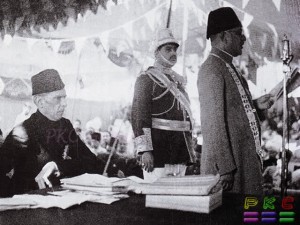Jinnah’s Pakistan and the Shariah onslaught – Part 1
Tuesday, October 25th, 2011 12:52:20 by Fouad Ashraf
The Lahore Resolution (23 March 1940) stipulated that Muslim-majority areas “in the north-western and eastern zones of India should be grouped to constitute independent states.” The word “Pakistan” was not used in the resolution, which envisaged the establishment of two or more states. Nevertheless, six years later, a Muslim League convention in Delhi on April 11, 1946 adopted a resolution which demanded that Bengal, Assam, Punjab, Sind (Sindh), the-then NWFP and Baluchistan (Baluchistan) “where Muslims are in a dominant majority be constituted into a sovereign independent state.” Although it deviated from the formulation in the original Lahore Resolution which envisaged the creation of “independent states,” yet it did give momentum to Pakistan Movement.
It is very important to go back into our history to take note that none of the speakers at the Muslim League session which adopted the Lahore Resolution mentioned the need for an Islamic government or the enforcement of Shariah. Quaid-e-Azam too repeatedly emphasized that he had never envisaged Pakistan as a theocratic state. Jinnah while addressing the people of United States on 11 August 1947 explained the contours of constitution for newly born country, which meant that religion, would be kept out of the matters of the State?
Yet, on March 12, 1949, barely six months after his death, the non-representative Constituent Assembly adopted the 10 point Objectives Resolution, which pledged that the future constitution would be governed by the tenets of Islam.
Historical events from 1940-1948 reveal that Pakistan was conceived as a secular state.
It cannot however be denied the Muslims of the subcontinent did and still exist as a separate cultural entity, but their entity never demanded that the state affairs should be run on religious injunctions. Religion does influence a culture so does the culture to religion but it does not and cannot form a theocratic state. That is the reason we find nation states all over the globe.
Quaid-e-Azam died on 9th September 1948. The constitutions of the 50s and the 60s further boosted religious orthodoxy giving a political space to religious clerics who constituted political parties and joined the main stream political arena. Pakistan was termed as a fortress of Islam on several occasions by different political and military rulers in Pakistan. Three major wars with India, vis-à-vis the Kashmir issue and battle for Kargil should be seen in context of same religious sentiment. The ‘Kafir vs Muslim’ factor was amply used to boost morale of military as well as civilian population during wars of 1965, 1971 and Kargil.
The constitution of Pakistan being origin of all laws in the country allows only a Muslim to hold the important office of the Government and the State, which is not only tangent to Quaid’s vision but also against basic human rights. The article of constitution that says that laws of the country should be framed in accordance with injunctions of the Quran and the Sunnah is difficult to implement in the wake of different interpretations of these sources of law by various Sects of Islam. Government must not promote any certain religion in that sense and must be secular in nature to ensure fairness to the citizens with various beliefs. The religious inclinations of our leaders and people were exploited by clever and developed nations achieve guard and promote their own interests in this region.
to be continued…..
Tags: Quaid e Azam, ShariahShort URL: https://www.newspakistan.pk/?p=1477


















I am for a secular Pakistan. This article speaks out my heart.
Hope more interesting is yet to come.
Excellent work by Fouad.
Waiting for more….
Naeem Ashraf.
excellent work! someone should speak out for things like this…………….Mouaz Naeem
Good article on very important issue confronting our nation. Our youth should speak out in order to save the nation from plunging into dark and closed tunnel of bigotry which being promoted in Pakistan in the name of Islam.
Keep up Fouad Ashraf